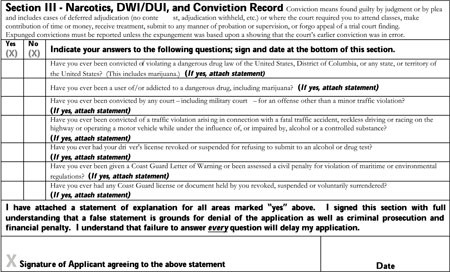 |
|
The National Maritime Center’s merchant mariner license application asks pointed questions about previous criminal convictions, including drug-related or drunken-driving offenses. The Coast Guard said too many applicants don’t answer truthfully. |
|
Courtesy National Maritime Center |
There was a significant increase last year in the number of fraudulent applications sent to the National Maritime Center (NMC) for merchant mariner credentials. The problem is that mariners are failing to disclose prior convictions.
“While we noted very few fraudulent applications in 2013, the National Maritime Center has received nearly 30 times more fraudulent applicants this year (2014),” Capt. Jeffrey P. Novotny, NMC commanding officer, told Professional Mariner in a written reply to questions.
Federal regulations require that “each applicant must provide written disclosure of all prior convictions not previously disclosed to the Coast Guard on an application,” according to a NMC news release.
There are seven questions in Section III of the license application, titled “Narcotics, DWI/DUI, and Conviction Record.” Applicants must answer whether they have been convicted of violating a drug law or have used dangerous drugs, had their driver’s license revoked or suspended for refusing an alcohol or drug test, been convicted for reckless driving or being involved in a fatal accident, been penalized or warned for violating maritime environmental laws, and had their Coast Guard license revoked, suspended or voluntarily surrendered. The question about prior convictions reads: “Have you ever been convicted by any court — including military court — for an offense other than a minor traffic violation?”
Novotny said the center cannot figure out the cause of the increase or why it is happening now. “The National Maritime Center recognizes that mistakes on applications are possible, but it is difficult to determine honest mistakes from deliberate fraudulent attempts,” he said. The errors are discovered through the various criminal databases the NMC uses in the application process.
The rise in fraudulent applications is likely because mariners may not understand that they have to provide information on all past convictions, not just ones that have occurred since their last application, according to licensing consultant Charles “Chuck” Kakuska, president of Sea K’s Maritime Licensing Service in Temperance, Mich. In the section of the form where mariners must answer if they have had any previous convictions, “they still have to answer yes, even if the conviction was 20 years ago and they have already told the Coast Guard four times,” he said. “I think this is more confusion than a case of hardened criminals trying to get into the industry.”
But Mark Grossetti, of Grossetti License Consulting in Framingham, Mass., said he believes the problem is not confusion but mariners who want to suppress these convictions, and provide false information as a result. “For reasons I can’t explain, guys get themselves into trouble by not answering the questions correctly,” he said.
Novotny reminds mariners that the Coast Guard’s definition of a conviction is: “If an applicant pleads guilty or no contest, is granted deferred adjudication, or is required by a court to attend classes, make contributions of time or money, receive treatment, submit to any manner of probation or supervision, or forgo appeal of a trial court’s conviction, then the Coast Guard will consider the applicant to have received a conviction.”
Grossetti said one problem is that mariners get advice from people who are not qualified. “Guys listen to their brother-in-law — the ‘expert’ — or they consult their own attorney, who will not give them the correct information,” he said. Grossetti’s advice is straightforward: “The bottom line is, if in doubt about an incident, assume the incident was a conviction.”
Novotny said bad advice is a problem. “The ‘bad advice’ errors usually occur when the mariner listens to a third party and uses their interpretation of what a conviction is,” he said.
He said the National Maritime Center is working on a new application that will improve instructions for the mariner and make the layout, wording and content of the forms more logical. That new document was scheduled to be approved by early 2015.
